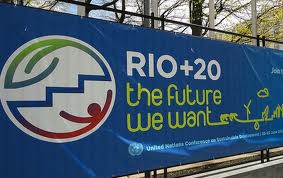Dodging U.N. Bullet
Like “abracadabra,” these nebulous concepts were supposed to transform the world into a Garden of Eden global community, under United Nations auspices, that will use less, pollute less, and save species and planet from their worst enemy: humans.
by Paul Driessen and Duggan Flanakin
The Future We Wantoutlined a “common vision” for planetary “sustainable  development,” as proclaimed by the Rio+20 summit that ended recently in disarray and acrimony.
development,” as proclaimed by the Rio+20 summit that ended recently in disarray and acrimony.
The activist organizations that cobbled the document together filled it with hundreds of platitudes and pseudo-solutions to global warming cataclysms, newly reconstituted as threats to resource depletion and biodiversity – and presented as standards and mandates for countries, communities and corporations.
The terms “sustainable development,” “sustainable” and “sustainability” appeared in the original text an astounding 390 times. Like “abracadabra,” these nebulous concepts were supposed to transform the world into a Garden of Eden global community, under United Nations auspices, that will use less, pollute less, and save species and planet from their worst enemy: humans.
To glean the document essence, however, readers only needed to understand two concepts: control and money – to impose the future the activists wanted.
The NGOs and UN called for “donations” from formerly rich European Union and Annex II (Kyoto Protocol) countries, at 0.7% of their gross national product per year. With the combined GNP of the contributing nations totaling about $45 trillion in 2010, the transfers would total $315 billion per year, or $3.2 trillion per decade.
President Obama and Secretary of State Clinton had previously committed the United States to provide up to $105 billion annually, based on our $15 trillion GNP (and stressed-out line of credit). With US per capita GNP pegged at $47,340 – each American family of four would pay $1,325 a year. That may seem like chump change compared to TARP, Obamacare or the Obama Stimulus. But over a decade US citizens would involuntarily shell out well over a trillion dollars to UN sustainability schemes.
The UN claims it has already received more than $500 billion in pledges from governments and companies, to reduce fossil fuel use, increase renewable energy generation in poor countries, promote bicycle use in Holland, teach sustainability in universities, conserve water – and in passing reduce global poverty. Time will tell how many pledges are worth the paper they were printed on
To oversee this unprecedented wealth transfer to UN bureaucrats and NGO activists, The Future We Want architects sought to establish “an intergovernmental process” to assess financial needs, consider the effectiveness, consistency and “synergies” of existing instruments and frameworks, evaluate additional initiatives, and prepare reports on financing strategies. This grand scheme would be implemented by an intergovernmental committee of 30 “experts,” who will be accountable to – no one, actually, except perhaps the Secretary General of the esteemed United Nations.
In essence, the Rio+20 message was, “You got a problem? The UN team has an app for that!”
From poverty eradication to food security, nutrition and “sustainable agriculture,” to water and sanitation, to energy, sustainable tourism and transport, and sustainable cities and “human settlements,” the Future We Want “framework for action and follow-up” had it covered! Of course, there were caveats.
Thankfully – despite attendance by 45,000 delegates from 180 nations – the Rio+20 summit became just another gabfest, the mandates became even more ill-defined “goals” and “recommendations,” and the world dodged another Kyoto-style bullet.
The activists and bureaucrats will doubtless be back, in a couple more years, in an exotic new locale, with new plans for saving the planet from scary new catastrophes.
However, poor countries are slowly catching on that these UN events are little more than neo-colonialist, eco-imperialist schemes to control and restrict economic development – and poor families are beginning to realize they won’t get a dime from these sustainability pledges or derive any tangible benefits from the green schemes.
Paul Driessen is senior policy advisor for the Committee For A Constructive Tomorrow (www.CFACT.org and www.CFACT.tv) and author of Eco-Imperialism: Green power – Black death. Duggan Flanakin is director of research and international programs for CFACT.
This article originally appeared conservative.org‘s BattleLine.
Help Make A Difference By Sharing These Articles On Facebook, Twitter And Elsewhere:
